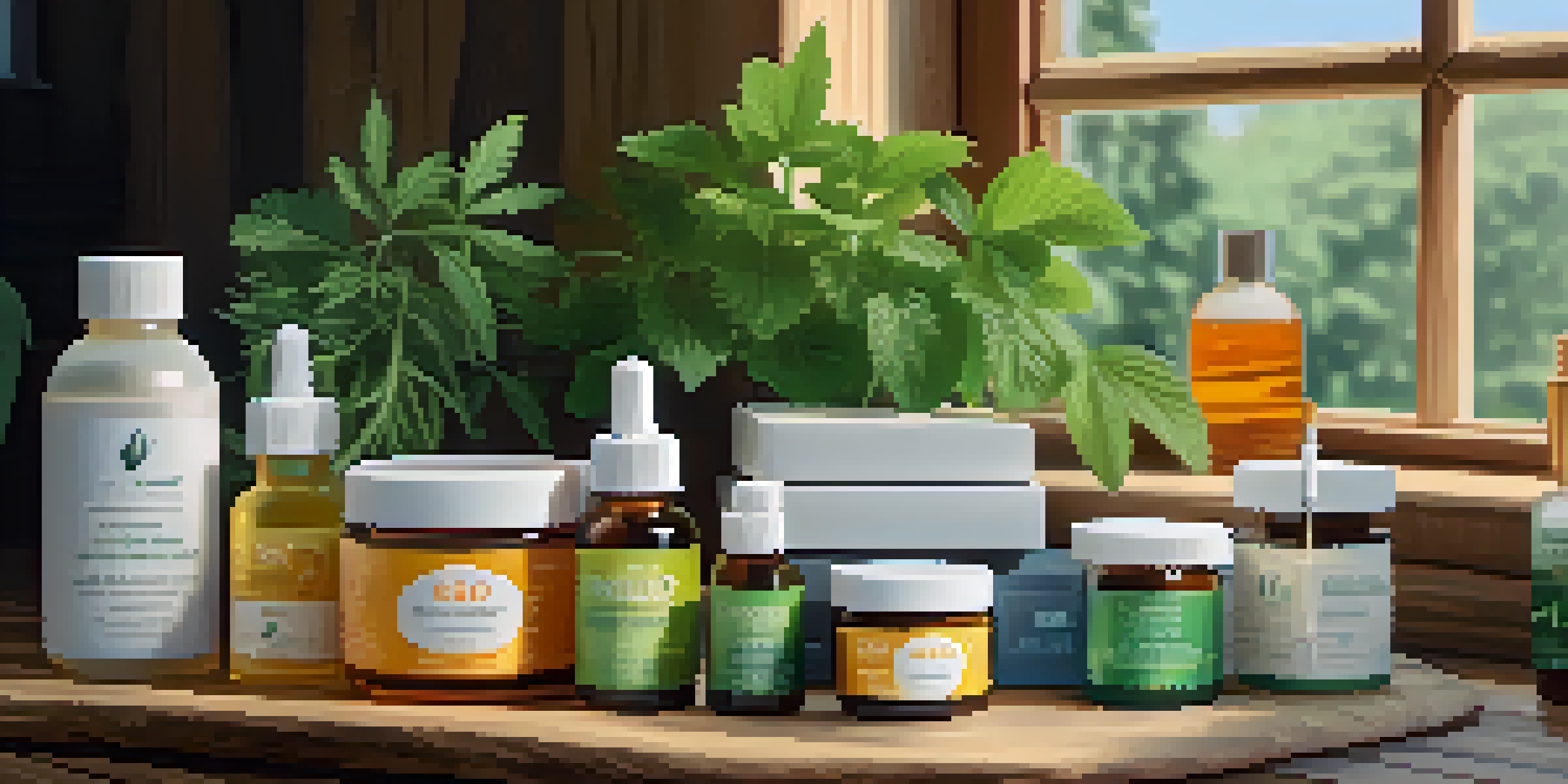Consumer Attitudes Towards CBD vs. THC Products Explained

The Rise of CBD and THC: A Brief Overview
In recent years, both CBD and THC have surged in popularity, largely due to the growing acceptance of cannabis in various forms. CBD, or cannabidiol, is a non-psychoactive compound found in cannabis plants, while THC, or tetrahydrocannabinol, is known for its psychoactive effects. Understanding these two compounds is essential for consumers to make informed choices about their use.
The greatest wealth is health.
While THC is often associated with recreational use and the 'high' sensation, CBD is frequently marketed for its potential health benefits without the euphoric effects. This distinction has led to a varied consumer base, with some gravitating towards CBD for wellness, while others favor THC for relaxation and enjoyment. The contrasting uses set the stage for divergent consumer attitudes.
As more research emerges, the landscape of consumer preferences continues to evolve. Many consumers are now looking at both products through the lens of personal health, lifestyle choices, and legal considerations. This evolving relationship with cannabis compounds tells a complex story of modern consumerism.
Consumer Preferences: CBD vs. THC
Consumer preferences for CBD and THC often hinge on individual needs and desired effects. Many people seeking relief from anxiety or chronic pain prefer CBD, attracted by its therapeutic properties without the psychoactive effects. In contrast, those looking for a recreational experience or deeper relaxation often opt for THC.

Surveys indicate that a significant portion of consumers are still wary of THC due to its psychoactive nature, which can lead to feelings of paranoia or anxiety in some individuals. This apprehension can deter users from exploring THC products, even when they might benefit from its effects. Conversely, CBD has gained a reputation as a more 'user-friendly' option.
CBD vs. THC: Divergent Preferences
Consumer choices between CBD and THC are shaped by individual needs, with CBD favored for its health benefits and THC for recreational use.
The distinction in preferences can also be affected by demographic factors, such as age and lifestyle. Younger consumers might be more open to experimenting with both compounds, while older generations may lean towards CBD for its medicinal claims. This diverse landscape of preferences paints a rich picture of consumer attitudes.
Health and Wellness: The Appeal of CBD
The health and wellness industry has embraced CBD, promoting it as a natural remedy for various ailments, from anxiety to inflammation. This has led to a surge in CBD-infused products, including oils, gummies, and topical creams, making it highly accessible to consumers. Many are drawn to CBD as a holistic alternative to conventional medicine.
The mind is everything. What you think you become.
Consumer testimonials often highlight positive experiences with CBD, which helps build trust and credibility around the product. These firsthand accounts can significantly influence potential users, as they see tangible results from others similar to them. This word-of-mouth marketing proves powerful in shaping consumer attitudes toward CBD.
However, it's essential for consumers to approach CBD with realistic expectations. While many find relief and relaxation, the effects can vary from person to person. Education on dosage and product quality becomes crucial, reinforcing the need for consumers to do their research before diving into the world of CBD.
Recreational Use: THC's Unique Appeal
For many, THC represents an enjoyable experience, often associated with socializing and relaxation. The psychoactive effects of THC can enhance sensory experiences, making it popular in social settings or during creative activities. This allure is a significant factor in its widespread acceptance among certain consumer demographics.
Additionally, THC has been linked to various medicinal benefits, including pain relief and appetite stimulation. This dual role—both recreational and therapeutic—contributes to its appeal, attracting a diverse range of consumers. The ability to enjoy THC both for fun and health reasons encourages its continued popularity.
Health Benefits Drive CBD Popularity
The rise of CBD in the wellness industry highlights its appeal as a natural remedy for various ailments, leading to an increase in accessible products.
Despite its allure, consumers must remain mindful of responsible use. Understanding the right dosage and the potential side effects is crucial to ensure a safe and enjoyable experience. This knowledge can empower consumers to navigate their choices with confidence.
Legal Landscape: Influencing Consumer Choices
The legal status of CBD and THC significantly impacts consumer attitudes and behaviors. In many regions, CBD is fully legal and widely accepted, often leading to a more relaxed attitude among consumers. Conversely, THC's legal status varies widely, influencing how consumers perceive its safety and desirability.
In states where THC is legal, consumers often feel more comfortable exploring its benefits. However, in areas where it remains illegal, users may approach the product with apprehension or fear of legal repercussions. This discrepancy creates a complex relationship with cannabis products for many consumers.
As laws continue to change and evolve, consumer attitudes may shift, leading to increased acceptance and exploration of THC products. Keeping abreast of legal developments can help consumers navigate their choices and feel more informed about their options.
Marketing Strategies: How Brands Target Consumers
Brands in the CBD and THC markets employ diverse marketing strategies to resonate with their audiences. For CBD, messaging often emphasizes wellness, natural ingredients, and therapeutic benefits, appealing to health-conscious consumers. In contrast, THC marketing may focus on the enjoyment and social aspects, attracting those looking for recreational experiences.
Social media platforms play a crucial role in these marketing efforts, allowing brands to connect directly with consumers and share educational content. This direct engagement fosters a community where consumers can learn, ask questions, and share experiences. Brands that prioritize transparency and education tend to build stronger relationships with their audiences.
Legal Status Affects Consumer Views
The legal landscape surrounding CBD and THC significantly influences consumer attitudes, with more acceptance in regions where cannabis is legalized.
Moreover, the way products are presented—packaging, branding, and lifestyle imagery—also influences consumer perceptions. A strong, relatable brand identity can create loyalty and trust, encouraging consumers to choose one product over another. This dynamic interplay between marketing and consumer attitudes shapes the landscape of CBD and THC products.
Future Trends: The Evolving Consumer Landscape
As the cannabis industry matures, consumer attitudes toward CBD and THC products are likely to evolve. Increased research and education surrounding the benefits and risks associated with both compounds can empower consumers to make informed decisions. This growing knowledge base may lead to a more nuanced understanding of how these products fit into their lives.
Additionally, as more states and countries legalize cannabis in various forms, we may see a shift in consumer preferences and behaviors. The stigma associated with THC may continue to diminish, leading to broader acceptance and exploration of its benefits alongside CBD. This potential shift could redefine the consumer landscape significantly.

Ultimately, the future will likely bring more innovative products and applications for both CBD and THC. As consumers become more discerning and informed, brands will need to adapt their offerings to meet these changing preferences. Staying attuned to consumer needs will be key in shaping the direction of the cannabis market.